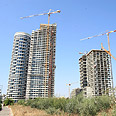
A tall order? (Illustration)
צילום: שאול גולן
Is ILA reform a good thing?
Many believe Land Administration reformation calling for cities to have extended land allocation, infrastructure development authorities premature. 'Municipalities must undergo reform first,' says real estate developer
The reformation of the Israel Land Administration (ILA) is nearing, but some believe that one of its primary goals – namely giving local authorities more say in land allocation – may be too far a reach.
The new reform sets out to dilute some of the ILA and its six district commissions' authority on land allocation and development, giving municipalities more of a say on the matter.
"The reformation onto itself is a good thing, but before a reform which extracts matters of development and infrastructure from the ILA can be applied, one must be applied to local municipalities, said Hanan Mor, founder and CEO of Hanan Mor Group, which heads real estate projects.
"If the cities were to take on these new authorities now, at their present state, the levels of environmental and residential development will substantially decrease."
The rules under the ILA are very clear, he added: "They issue a tender which has very clear development guideline, a clear timetable and known costs. When developers bid, they know exactly what to do. The ILA also demands the development budget be paid in advance and in full, and there is no leeway.
"Having local municipalities take over will mean longer schedules and the money would probably be collected in the form of levies and taxes, funneling it to the cities' budget, where they can use it as they see fit; the consequence being worse (infrastructural) planning."
Mor also warned of the possibility of politics tainting the process "and instead of achieving the desired result of transparency – which is what the reform is about – we'll be seeing plenty of 'machers.' The municipalities are in no condition to take over for the Israel Land Administration when it comes to transparency and integrity ."
One of the main problems noted in the suggested reform is the fact that it lacks any reference to the agricultural sector, dealing only with its urban counterpart.
The official reason given by the ministerial committee which ordered the reform, was that the matter was "too complex" to be addressed at this time.
Barry Holtzman, head of the Admati ("My Land") Association, which aims to protect the proprietary rights of rural communities, believes the reasons are quite different: "There is a long standing policy of discrimination between urban and agricultural communities," he says, adding that the policy stems from two core perceptions.
"The first is the belief that farmers have paid little to no land leasing fees, and the second is the belief that allotting land for the purpose of farming is the same is giving it away. The agricultural sector holds 1.23 million acres, with the estimated worth of $80 billion. The ILA just doesn’t want to deal with that."
Ory Chudy contributed to this report










